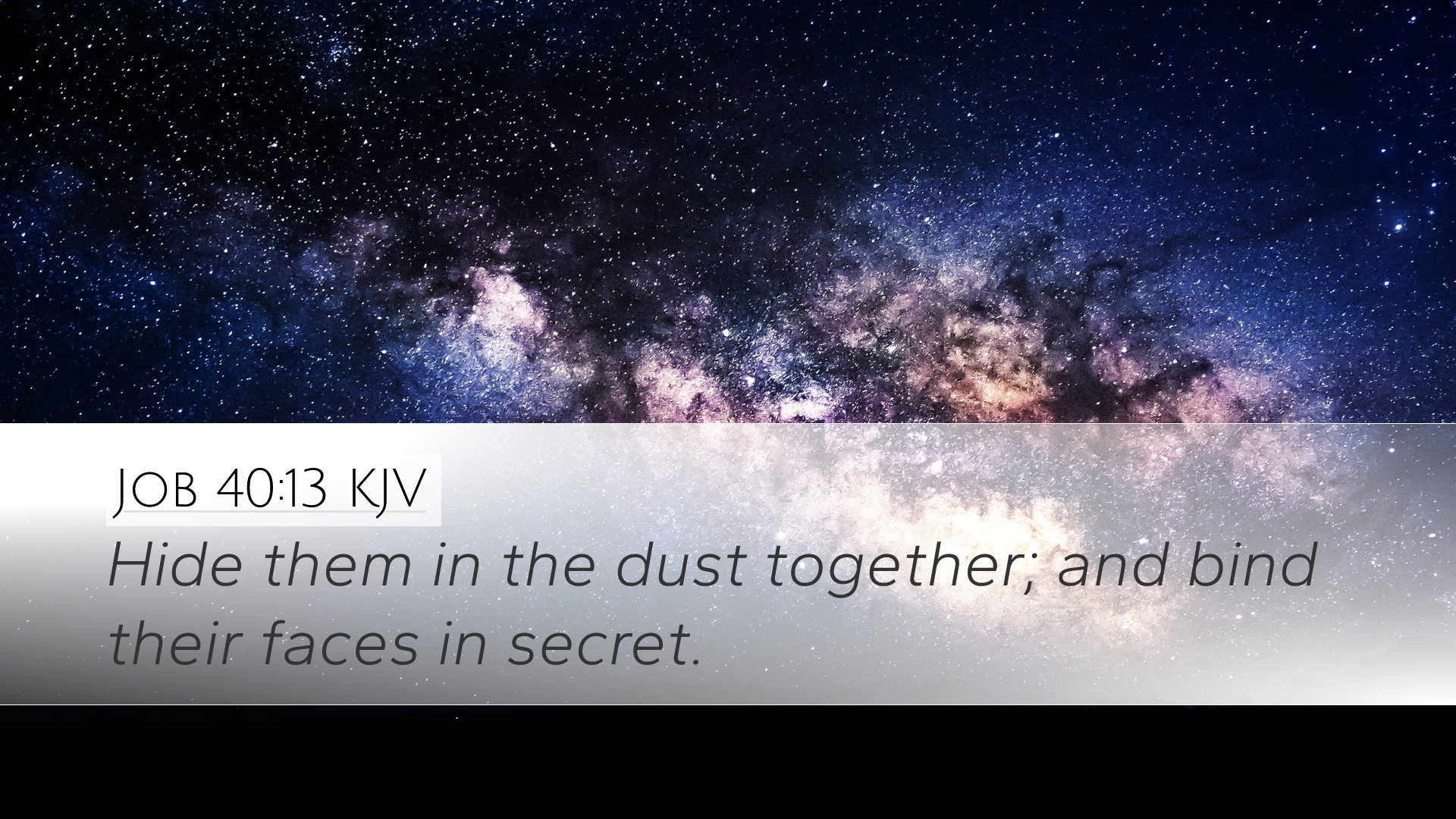Old Testament
Genesis Exodus Leviticus Numbers Deuteronomy Joshua Judges Ruth 1 Samuel 2 Samuel 1 Kings 2 Kings 1 Chronicles 2 Chronicles Ezra Nehemiah Esther Job Psalms Proverbs Ecclesiastes Song of Solomon Isaiah Jeremiah Lamentations Ezekiel Daniel Hosea Joel Amos Obadiah Jonah Micah Nahum Habakkuk Zephaniah Haggai Zechariah MalachiJob 40:13
Job 40:13 KJV
Hide them in the dust together; and bind their faces in secret.
Job 40:13 Bible Commentary
Bible Commentary on Job 40:13
Verse Reference: Job 40:13 - "Hide them in the dust together; and bind their faces in secret." (KJV)
Introduction
The book of Job, a profound exploration of human suffering and divine sovereignty, invites readers into the complex dialogue between Job and God. In Job 40, God responds to Job's challenges and questions about his suffering, culminating in vivid imagery and rhetorical questions that underscore the greatness of divine wisdom and power. Verse 13 is critical in illustrating God's purpose and authority over creation, particularly in relation to the proud and wicked.
Contextual Analysis
This passage occurs after a lengthy discourse by Job lamenting his circumstances and asserting his innocence. God, in his response, shifts the focus from Job’s plight to the majesty of creation, highlighting not only his omnipotence but also the futility of human attempts to question divine governance.
Divine Rhetoric
In God’s speech (Job 38-41), He employs powerful imagery and asks Job a series of questions that show Job’s limited understanding. The phrase “Hide them in the dust” indicates the Lord's intention to cover the proud and wicked, suggesting a temporary concealment of their fate. Furthermore, this is a stark reminder of the ultimate judgment that awaits those who oppose God.
Commentary Insights
Insights from Matthew Henry
Matthew Henry emphasizes the overwhelming power of God as the Creator who governs all that He has made. He notes the exercise of divine justice and the assurance that the wicked will not escape unpunished. God, through His questioning, illustrates the impossibility of understanding divine matters without His revelation. Henry asserts that this passage conveys both the gravity of sin and the need for humility before God’s providence.
Insights from Albert Barnes
Albert Barnes offers a more detailed examination of the metaphorical language in Job 40:13. He interprets “bind their faces in secret” as an expression of God’s power to restrict the proud, rendering them powerless before His majesty. Barnes also highlights the theme of secrecy in divine judgment, indicating that while the wicked may appear to thrive temporarily, their ultimate end is assured, and their plans will be thwarted in divine wisdom.
Insights from Adam Clarke
Adam Clarke provides linguistic and contextual analysis, pointing out that the phrase “Hide them in the dust” might imply both a physical and spiritual dimension. Clarke suggests that this hiding of the wicked signifies their insignificance when placed against the backdrop of God’s vast creation. His commentary enhances our understanding by underscoring that God’s judgments, while sometimes unseen, are inescapable and will ultimately manifest in His timing.
Theological Implications
Job 40:13 serves as a critical reminder to both believers and the wider community of faith about the nature of God’s justice. It prompts serious theological reflections on the themes of humility, divine righteousness, and human limitation. This verse encourages a posture of reverence and submission in the face of God’s supreme authority.
Humility Before God
The challenge for believers, as derived from this commentary, is to adopt a humble stance towards God, recognizing His vastness and our own limitations. This humility is essential in living a life that is reflective of God's character and righteousness.
Reflecting on Divine Justice
In light of the verse, pastors and theologians should consider how to convey the certainty of divine justice to their congregations. The passage assures believers that injustice shall not prevail and that God administers the world with wisdom, ultimately bringing about His purposes.
Practical Applications
- Encouragement in Suffering: Job’s experience resonates with many today; pastors can utilize this verse to assure congregants that God sees and will address injustice.
- Emphasizing God’s Sovereignty: Teach about the sovereignty of God in all circumstances, encouraging a deep confidence in divine providence.
- Promoting Humility: Foster discussions on humility in prayer and personal conduct, reflecting on the vastness of God’s knowledge and power.
- Hope for the Oppressed: Remind those who feel oppressed that God’s justice, though sometimes delayed, will ultimately prevail, offering comfort and hope.
Conclusion
Job 40:13 encapsulates the essence of God’s authority over creation and the moral order of the universe. Through the insights of revered commentators, we glean deep theological insights that are relevant to today’s church. The call is clear: uphold God’s majesty and navigate life with humility and faith, trusting in His righteous judgment over all creation.


